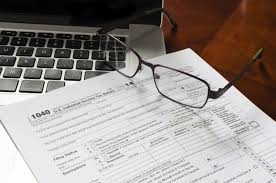Understanding tax return preparer credentials and qualifications
Any tax professional with an IRS Preparer Tax Identification Number (PTIN) is authorized to prepare federal tax returns. However, tax professionals have differing levels of skills, education and expertise.
An important difference in the types of practitioners is “representation rights.” Here is guidance on each credential and qualification:
Unlimited Representation Rights: Enrolled agents, certified public accountants, and attorneys have unlimited representation rights before the IRS. Tax professionals with these credentials may represent their clients on any matters including audits, payment/collection issues, and appeals.
- Enrolled Agents – Licensed by the IRS. Enrolled agents are subject to a suitability check and must pass a three-part Special Enrollment Examination, which is a comprehensive exam that requires them to demonstrate proficiency in federal tax planning, individual and business tax return preparation, and representation. They must complete 72 hours of continuing education every 3 years. Learn more about the Enrolled Agent Program.
- Certified Public Accountants – Licensed by state boards of accountancy, the District of Columbia, and U.S. territories. Certified public accountants have passed the Uniform CPA Examination. They have completed a study in accounting at a college or university and also met experience and good character requirements established by their respective boards of accountancy. In addition, CPAs must comply with ethical requirements and complete specified levels of continuing education in order to maintain an active CPA license. CPAs may offer a range of services; some CPAs specialize in tax preparation and planning.
- Attorneys – Licensed by state courts, the District of Columbia or their designees, such as the state bar. Generally, they have earned a degree in law and passed a bar exam. Attorneys generally have on-going continuing education and professional character standards. Attorneys may offer a range of services; some attorneys specialize in tax preparation and planning.

Irs annual filing season program – record of completion holders
The Annual Filing Season Program (AFSP) recognizes and encourages the voluntary efforts of unenrolled tax return preparers to increase their knowledge and improve their filing season competency through continuing education. AFSP – Record of Completion Holders must meet annual educational requirements set by the IRS and either take and pass an annual tax refresher course or have passed other IRS recognized state or national competency tests such as ACAT’s Accredited Business Accountant and Accredited Tax Preparer. (Read more on ACAT credentials below.)
Annual Filing Season Program participants are included in a public database of return preparers on the IRS website. Annual Filing Season Program participants have limited representation rights, meaning they can represent clients whose returns they prepared and signed, but only before revenue agents, customer service representatives, and similar IRS employees, including the Taxpayer Advocate Service. PTIN holders without an Annual Filing Season Program – Record of Completion or other professional credentials will only be permitted to prepare tax returns. For returns prepared and signed after December 31, 2015, they will not be allowed to represent clients before the IRS.
Accredited Tax Advisors (ATA) – These practitioners can handle sophisticated tax-planning issues. Their expertise covers tax returns for individuals, business entities, fiduciaries, trusts and estates, tax planning, and tax consulting. ATAs follow a code of ethics and complete continuing education requirements.
Accredited Tax Preparers (ATP) – These practitioners have a thorough knowledge of tax code and the preparation of individual tax returns. Their expertise covers comprehensive 1040 issues, including supporting schedules and self-employed returns. ATPs follow a code of ethics and complete continuing education requirements.

Ways to verify you have a reliable tax preparer
If you use a tax preparer to file your tax return for you, you give them a lot of delicate information. They know all about your finances, your marital status, your contact information, and they even have your Social Security number. So wouldn’t you want to verify that the person you’re handing that data to is someone reliable?
Your answer is probably yes, but according to a recent survey, roughly 80% of people who hire a tax preparer never ask about the person’s credentials or qualifications. If you choose to hire a tax preparer, steps you should follow to ensure that the person you work with is reliable and qualified to handle your return.
Ask for their ptin
Anyone who is paid to prepare federal tax returns is required to have a Preparer Tax Identification Number, or PTIN. Be sure to ask anyone you hire if you can have their PTIN, and be sure to check it on the IRS’s directory of federal tax return preparers. Note, however, that volunteer tax preparers are not required to have a PTIN, only paid professionals.
Ask for other credentials
Getting a PTIN actually isn’t all that difficult, so it’s best if you work with a tax preparer who has other qualifications and credentials. You should only entrust your return to a certified public accountant, enrolled agent, licensed attorney, or someone who has completed the IRS’s Annual Filing Season program. All of these credentials require the individual to study, pass certain exams, and participate in ongoing education courses, which means you can be certain that they are up to date on tax laws and can handle your return appropriately.
If you want to find a tax preparer with specific credentials, you can search the IRS’s directory. This will show you tax preparers in your area that possess both a PTIN and some form of IRS-recognized credential. Volunteer preparers and those with only a PTIN are not listed in the directory.

Examine their fees
Flat-rate fees can be eye-catching and quite tempting when you’re looking to save a few bucks on preparing your return. But legitimate tax preparers usually charge by the hour. So, if you find a preparer that is charging based on the size of your return, you should be skeptical. Additionally, if the person is promising they can get you a bigger return than another preparer, this should be a major warning sign for you; legitimate preparers cannot make promises about the size of your return.
Make sure they e-file
If a paid preparer processes more than 10 returns for their clients, the IRS requires the preparer to file the returns electronically through their e-filing system. So, if your tax preparer does not offer the option to e-file, this is likely a sign that they’re doing as much tax prep as you thought. You’re usually better off working with someone who handles many returns in a single year.
Ensure they’ll sign the return
Any paid preparer is required to sign their clients’ returns and provide their PTIN when the return is filed. Make sure that anyone you work with is willing to do both these things. If your preparer gives you a return that they have not signed or that does not have their PTIN, don’t sign. And never sign a blank return—the preparer could put anything on the return after you’ve signed it, including their own bank account information, which would allow them to steal your refund.
Ask if they’ll have your back
When you work with a certified tax preparer that has both a PTIN and an IRS-recognized credential, you’ll have professional support and backing with the IRS if there are any issues regarding audits, payment plans, collection issues, or appeals. So, if you work with a preparer who doesn’t have a PTIN, or who has one but possesses no other professional credentials, you’ll be on your own if the IRS decides to audit you.